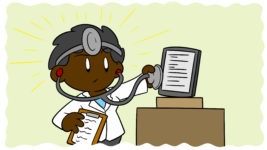Welcome to part 2 of this article. In part 1 (which you can read here), we talked about specific details you can search for in your manuscript that will indicate whether or not it’s time to hire a professional editor.
In part 2, we’ll be looking at five more signs, but this time we’re moving from the hyper-detailed to the larger milestones in the self-editing process. As a brief reminder, this advice applies to those authors wondering when to hire an editor to adjust their work on a line-by-line basis. If you’re working with an editor on a long-term basis, or to help find or shape your story, the below doesn’t apply.
So, without further ado, it’s only time to call an editor if…
6. You’re past your first draft
If you haven’t edited your work, your editor is going to be stuck addressing the biggest, most obvious issues, and their work may even end up pointless if you make changes later. Of course, the vast majority of authors don’t publish their first draft, and most also wouldn’t consider submitting their first draft to an editor, but ‘first draft’ doesn’t just mean ‘as it was first written’.
A few changes don’t make a new draft – are you setting useful goals as you edit?Click To TweetDifferent authors have different processes for self-editing, but a new ‘draft’ isn’t created every time you change a single detail. Instead, a ‘draft’ is a new form of a manuscript – it suggests at least some level of completion, though usually just in terms of having addressed a specific set of goals. If you’ve made scattered changes to your manuscript but you haven’t identified or worked towards a new ‘version’ – a new draft – it’s unlikely that you’re ready for an editor. First, assess your work as a whole, list any changes that need to be made, and work through a few more drafts, doing the same each time. This process will likely change some sections significantly, which is a big part of why it wasn’t worth your time to have them edited too early.
7. You’ve read your manuscript aloud
Reading your manuscript aloud is a great way to catch errors, from major issues with grammar to subtle phrasing and dialogue. In part 1, I mentioned word repetition and problems with dialogue, and reading aloud is one of the best ways to catch these issues.
If you haven’t read your work aloud, you haven’t yet utilized one of the most effective tools for assessing your own writing. For more details on how reading aloud works, check out Why Reading Aloud Will Dramatically Improve Your Writing.
8. You’ve consulted an alpha reader
Beta readers tend to be useful for assessing the content of your work, but an alpha reader – a friend or relative who can offer a separate (if biased) eye – can catch a lot of issues that are invisible only to their creator.
In part 1, I mentioned characters whose names change partway through a manuscript. Authors tend to miss this because they have an intimate understanding of their characters – they don’t know them by their names so much as by their place in the story – but an alpha reader can catch details like this with ease. Whether they’re a friend, partner, or parent, they’re capable of identifying a host of minor issues for free, allowing your eventual editor to tackle trickier fare.
Alpha readers can catch errors that are obvious to the layman.Click To TweetIt’s important not to put too much stress on a loved one, but before you ask ‘Am I ready for an editor?’, it’s a good idea to ask ‘Is Now The Time For An Alpha Reader?’
9. You’ve spent time away from your manuscript
As a process, editing almost always changes your relationship to your work. Your insight will deepen as you explore it, but certain aspects will also grow familiar – some ideas that could be changed will end up taken for granted, and better approaches may begin to feel impossible.
Editing your book, taking some time away to regain perspective, and then editing it again is an essential part of self-editing for the vast majority of authors. There are ways to speed through multiple aspects of improving your work, but when it comes to assessing it with a little distance and context, only shutting it in a drawer for a month or two really works.
Time away from your manuscript is essential to preparing it for an editor.Click To TweetWithout this step, you’re likely to communicate aims to your editor that will have changed by the time they return your manuscript. Here, the risk isn’t that the editor ends up tackling areas in which you don’t ultimately need their help, but that their perception of your project is skewed. In the worst-case scenario, you’ll be itching to change the sections they just edited. It goes without saying that this process is a lot more constructive the other way around.
10. You don’t already know what you’re going to change next
Some authors contact editors seemingly as a form of sympathetic magic – you only contact an editor when you’re done self-editing, so if you contact an editor, that will magically bring your self-editing to a satisfying close.
Predictably, that’s not how it works, and such authors usually find that while their editor gave them some great advice, the majority of their services are lost in further self-editing changes they were always going to make.
It can be difficult to catch ourselves in this kind of thinking, but the most obvious sign is that you actually know exactly what you’re going to change next. I know it might sound odd, but many editors receive messages from authors who casually reference huge changes that they intend to make in the future. ‘I’m thinking about getting rid of this character’ or ‘I might rewrite chapter four once I’ve done some research’. Don’t misunderstand; there’s nothing wrong with getting an editor’s opinion on the direction of your story, but if you’re contracting someone to edit line by line, these are the kinds of decisions that should already be made. If chapter four gets rewritten, for example, you’ll need an editor to come back and edit the new work, so why bother improving something you intend to cut?
If you have a limitless budget, there’s no issue with this, but if you’re still planning major changes, it’s probably a sign that a) your self-editing isn’t finished or b) you’d be better off with a far less extensive editing service – for example, a simple manuscript critique, where an editor tells you what they think about the manuscript as a whole without charging for line-by-line changes.
If you know how your manuscript needs to change, is it really time for an editor?Click To TweetSometimes, it’s hiring an editor that jars these thoughts loose. You thought you were done self-editing but then, just as you hit ‘send’, a great idea comes along. You can’t help but build on it and, by the time the edited manuscript finally returns, you have a whole host of changes you want to make immediately. If this starts to happen, it’s reasonable to contact your editor and ask if they can pause your service. This may not be possible, but it’s worth asking, especially if you can offer a concrete deadline for when you’ll have a new version with them. If this isn’t possible, don’t be downhearted. It turns out this edit was a necessary part of unlocking your fresh insights! At the same time, try to write down the changes you’re going to make so they don’t feel so insistent. Your editor’s work is still going to be useful and insightful, so don’t let emerging ideas blind you to the resources that just arrived.
Ready for an editor?
No editor is eager to turn down work, but most of us genuinely want you to get the most out of our services. The tips above are all about ensuring that you’re using a limited resource at the time it will do your manuscript the most good.
That said, sometimes your process won’t be like anyone else’s. Maybe this project needed an early edit to help you order your ideas, or maybe a chaotic approach was just the path you needed to tread. The point isn’t to police you into a one-size-fits-all approach, just to offer some tools if you’re one of the authors out there worrying whether or not now is the time to hire an editor.
If these ten signs haven’t been enough to make up your mind, one final approach is to discuss it with your prospective editor. While they’re unlikely to tell you that you don’t need any editing at all (partly because they can always offer some form of help), they will help clarify which of their services is best used at what stage in your manuscript’s life.
Which of the above signs do you recognize from your own self-editing journey, and which would you suggest are added to the list? Let me know in the comments, and check out 3 Writing Myths You Should Feel Free To Ignore and What It’s Like To Work With An Editor for great advice on this topic.





